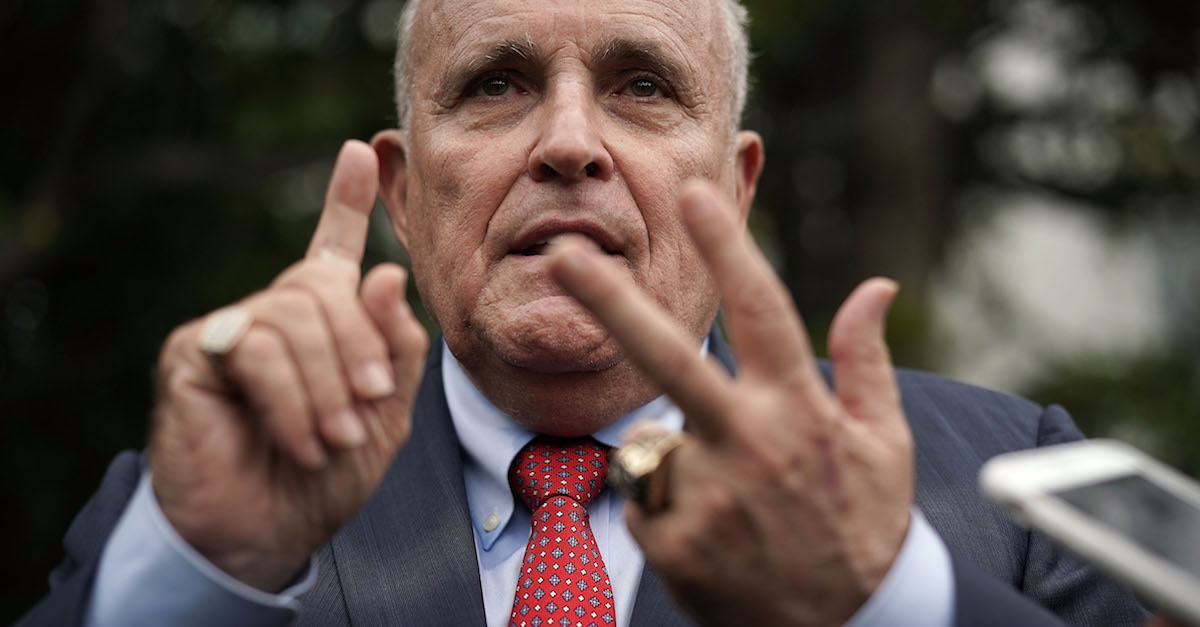
Rudy Giuliani nearly broke Twitter Wednesday night with his comments on possible collusion between Russia and the Trump campaign during a CNN interview. Despite President Donald Trump claiming for years that there was “no collusion” between his campaign and Russia, and that Special Counsel Robert Mueller‘s investigation of this is a “witch hunt,” Giuliani now claims that while Trump himself didn’t collude, he’s not saying others did not.
This latest shift in the narrative from Giuliani led some in the Twittersphere to wonder what the next change to Team Trump’s approach will be.
Fortunately, in that same interview, Giuliani dropped a pretty big hint, and he didn’t waste any time doing it. It happens at the 26-second mark of the video below.
“There is not a single bit of evidence that the President of the United States committed the only crime you could commit here, conspired with the Russians to hack the DNC,” Giuliani said.
Giuliani is trying to narrow the focus of how he wants people to look at the collusion angle by focusing solely on the Russian hack of Democratic National Committee emails. The problem is that his matter-of-fact statement that this is “the only crime you could commit here” is just not true.
There are a number of possible illegal activities that Trump or his campaign could have committed in connection with Russia. For starters, it’s illegal for foreign nationals to make campaign contributions, and it’s likewise illegal for candidates or their campaigns to accept them.
52 USC § 30121 states that it is prohibited someone to “solicit, accept, or receive” any “contribution or donation of money or other thing of value … in connection with a Federal, State, or local election.”
This means that if Russia gave the Trump or his campaign money, or any materials or information that have monetary value, that would likely be a violation.
It would also be a crime if Trump or his campaign conspired with Russia for a crime other than the DNC hack. For starters, there’s also the hack of Clinton campaign chair John Podesta‘s emails.
There is also speculation that Giuliani is worried about how the latest revelations about Paul Manafort could impact Trump.
By claiming that “the only crime you could commit” is conspiring with the DNC hack, Giuliani seems to be planting the seeds for his next move, a misdirection play: focus on the crime that (supposedly) didn’t happen, not the ones that may come out later.
Giuliani appears poised to claim that any other suspected crimes weren’t really crimes at all. Conservative author Jerome Corsi has already sued Mueller, denying that he had any involvement with or advance knowledge of the Podesta email hack, despite speculation that he and Roger Stone may have been involved with WikiLeaks, for the benefit of the Trump campaign. Giuliani could easily echo Corsi’s denial when it comes to that.
Rudy also has an excuse in place should there be any evidence that Russians gave any illegal campaign contributions. Remember what happened when Michael Cohen pleaded guilty to arranging illegal contributions in the form of payments to Stormy Daniels and Karen McDougal, and claimed it was all at Trump’s direction. Giuliani insisted that these weren’t even crimes. If evidence of Russian campaign contributions comes to light, expect more of the same.
As for Manafort, Giuliani is already in spin mode, downplaying the allegation that Manafort shared Trump campaign polling data with Russian associate Konstantin Kilimnik. Giuliani insisted that sharing polling data is no big deal, although as CNN legal analyst Elie Honig noted , one could make an argument that it could have been part of an effort to illegally solicit a foreign contribution.
So far, we don’t have any solid evidence linking Trump or his campaign to these crimes or any others, but Giuliani’s latest spin on the situation give the impression that he’s worried something is coming. If so, we now have a good idea of how he’ll handle it.
[Image via Alex Wong/Getty Images]
This is an opinion piece. The views expressed in this article are those of just the author.